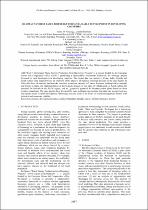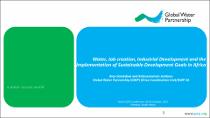 ResearchSpace
ResearchSpace
Re-impact: forest based bioenergy for sustainable development in developing countries
JavaScript is disabled for your browser. Some features of this site may not work without it.
- ResearchSpace
- →
- Research Publications/Outputs
- →
- Conference Publications
- →
- View Item
| dc.contributor.author |
Amezaga, JM

|
|
| dc.contributor.author |
Harrison, J

|
|
| dc.contributor.author |
Von Maltitz, Graham P

|
|
| dc.contributor.author |
Tennigkeit, T

|
|
| dc.contributor.author |
Tiwari, S

|
|
| dc.contributor.author |
Windhorst, K

|
|
| dc.date.accessioned | 2009-11-17T11:11:32Z | |
| dc.date.available | 2009-11-17T11:11:32Z | |
| dc.date.issued | 2009-06 | |
| dc.identifier.citation | Amezaga, JM, Harrison, J, Von Maltitz, G.P. et al. 2009. Re-impact: forest based bioenergy for sustainable development in developing countries. 17th European Biomass Conference and Exhibition. Hamburg, Germany, 29 June - 3 July 2009, pp 2487-2493 | en |
| dc.identifier.uri | http://hdl.handle.net/10204/3743 | |
| dc.description | 17th European Biomass Conference and Exhibition. Hamburg, Germany, 29 June - 3 July 2009 | en |
| dc.description.abstract | Re-Impact "Rural Energy Production from Bioenergy Projects" is a project funded by the European Union Aid Cooperation office which is promoting a sustainability assessment framework for bioenergy projects focussed on rural development in developing countries. The project has case studies in China, India, Uganda and South Africa. This paper provides an overview of the analysis of regional bioenergy policies in the case studies. In China the focus of attention has been the transition to modern biomass in Yunnan Province, looking both at Jatropha and forest; in India, the implementation of the biofuels strategy in the State of Chhattisgarh; in South Africa, the potential for biofuels in the SADC region; and in Uganda the potential for biomass power plants based on short rotation plantations. The case studies show the need for more evidence-base policies that take into account land use and equity issues in rural development. Bioenergy projects need to be based on sound management models with technical and economic viability | en |
| dc.language.iso | en | en |
| dc.subject | Biofuels | en |
| dc.subject | Forestry | en |
| dc.subject | Biomass | en |
| dc.subject | Forest based bioenergy | en |
| dc.subject | Sustainable development | en |
| dc.subject | Rural enery production from bioenergy projects | en |
| dc.subject | Developing countries | en |
| dc.subject | Jatropha curcas | en |
| dc.subject | Rural development | en |
| dc.subject | National biofuels policy | en |
| dc.subject | 17th European Biomass Conference and Exhibition | en |
| dc.subject | Bioenergy | en |
| dc.title | Re-impact: forest based bioenergy for sustainable development in developing countries | en |
| dc.type | Conference Presentation | en |
| dc.identifier.apacitation | Amezaga, J., Harrison, J., Von Maltitz, G. P., Tennigkeit, T., Tiwari, S., & Windhorst, K. (2009). Re-impact: forest based bioenergy for sustainable development in developing countries. http://hdl.handle.net/10204/3743 | en_ZA |
| dc.identifier.chicagocitation | Amezaga, JM, J Harrison, Graham P Von Maltitz, T Tennigkeit, S Tiwari, and K Windhorst. "Re-impact: forest based bioenergy for sustainable development in developing countries." (2009): http://hdl.handle.net/10204/3743 | en_ZA |
| dc.identifier.vancouvercitation | Amezaga J, Harrison J, Von Maltitz GP, Tennigkeit T, Tiwari S, Windhorst K, Re-impact: forest based bioenergy for sustainable development in developing countries; 2009. http://hdl.handle.net/10204/3743 . | en_ZA |
| dc.identifier.ris | TY - Conference Presentation AU - Amezaga, JM AU - Harrison, J AU - Von Maltitz, Graham P AU - Tennigkeit, T AU - Tiwari, S AU - Windhorst, K AB - Re-Impact "Rural Energy Production from Bioenergy Projects" is a project funded by the European Union Aid Cooperation office which is promoting a sustainability assessment framework for bioenergy projects focussed on rural development in developing countries. The project has case studies in China, India, Uganda and South Africa. This paper provides an overview of the analysis of regional bioenergy policies in the case studies. In China the focus of attention has been the transition to modern biomass in Yunnan Province, looking both at Jatropha and forest; in India, the implementation of the biofuels strategy in the State of Chhattisgarh; in South Africa, the potential for biofuels in the SADC region; and in Uganda the potential for biomass power plants based on short rotation plantations. The case studies show the need for more evidence-base policies that take into account land use and equity issues in rural development. Bioenergy projects need to be based on sound management models with technical and economic viability DA - 2009-06 DB - ResearchSpace DP - CSIR KW - Biofuels KW - Forestry KW - Biomass KW - Forest based bioenergy KW - Sustainable development KW - Rural enery production from bioenergy projects KW - Developing countries KW - Jatropha curcas KW - Rural development KW - National biofuels policy KW - 17th European Biomass Conference and Exhibition KW - Bioenergy LK - https://researchspace.csir.co.za PY - 2009 T1 - Re-impact: forest based bioenergy for sustainable development in developing countries TI - Re-impact: forest based bioenergy for sustainable development in developing countries UR - http://hdl.handle.net/10204/3743 ER - | en_ZA |







